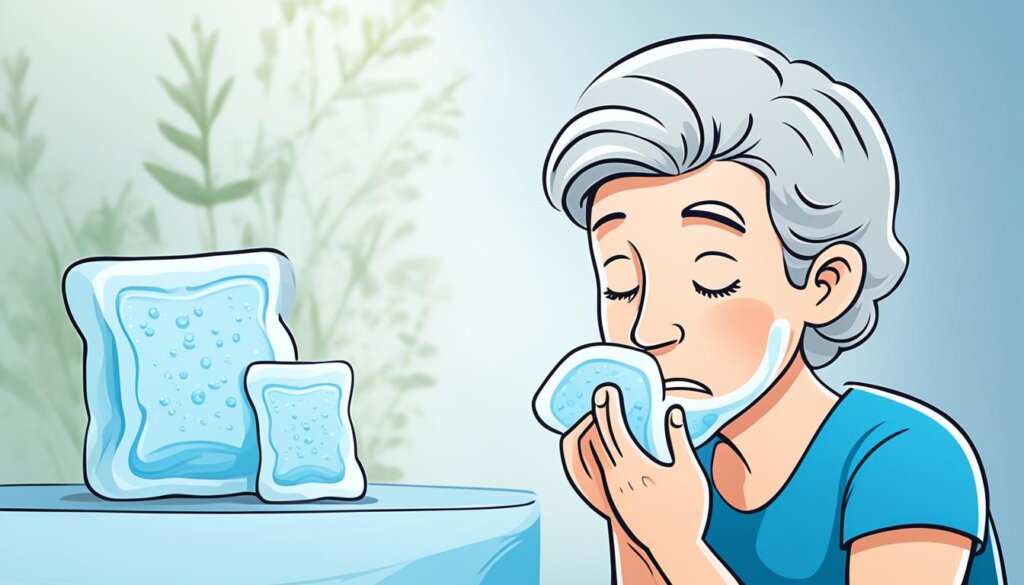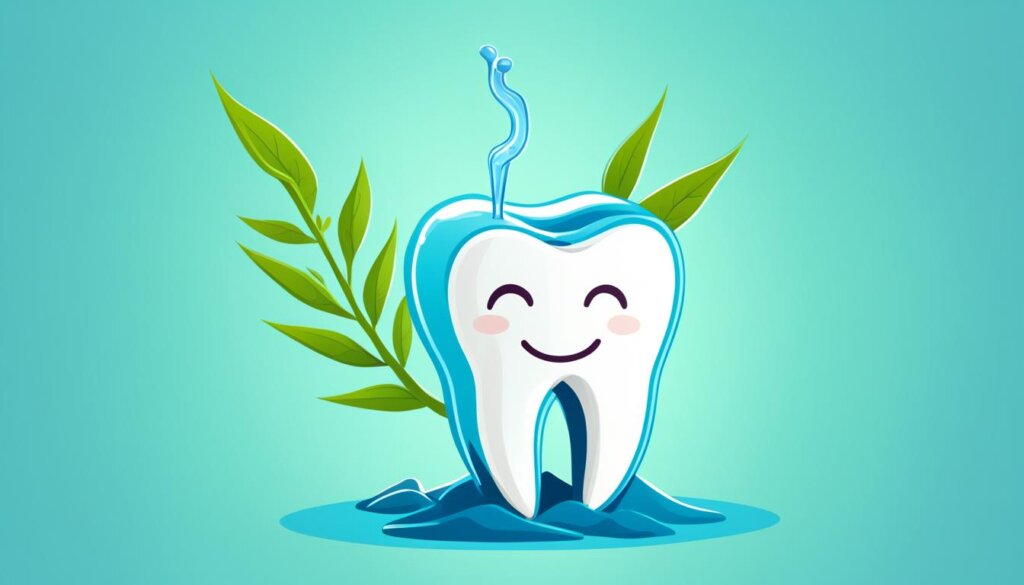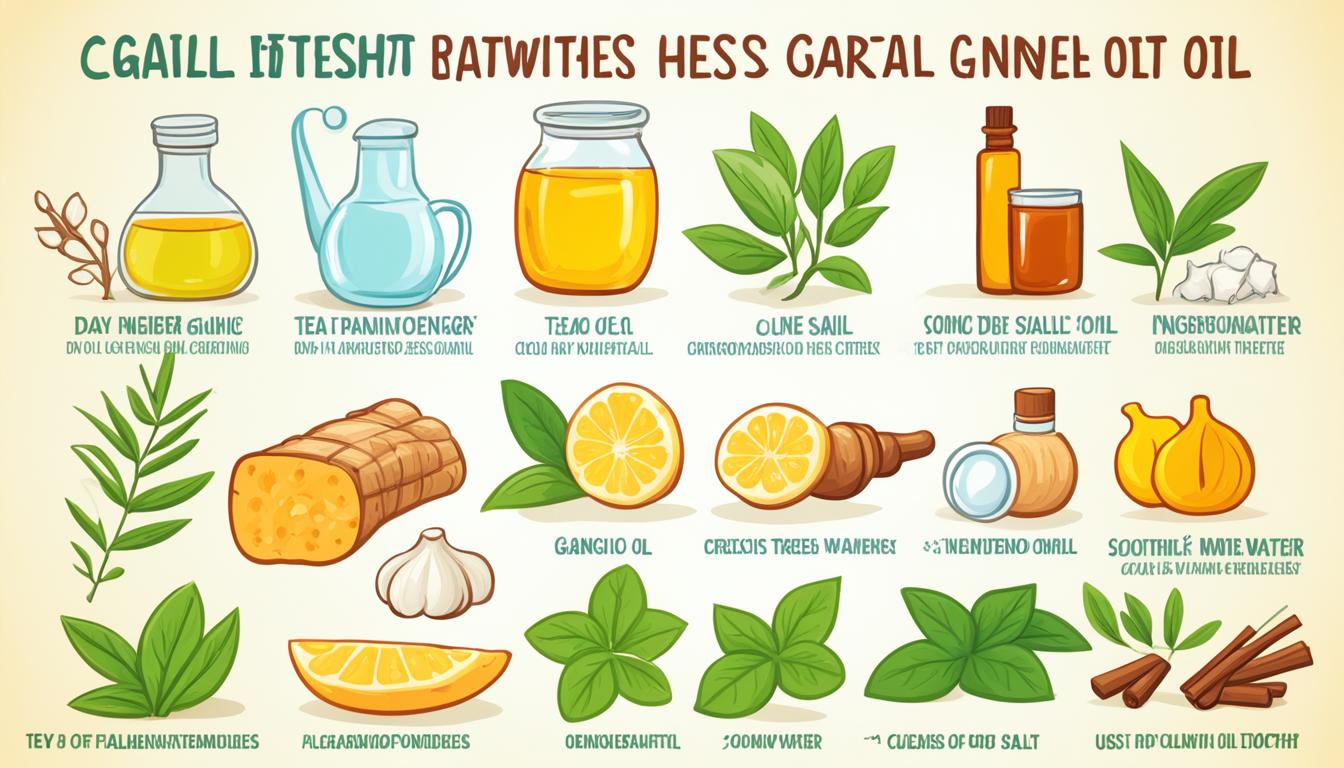FTC disclaimer: This post may contains affiliate links and we will be compensated if you click on a link and make a purchase.
Over-the-counter pain relievers like ibuprofen and naproxen are good for adults with toothaches. A toothache makes your head and gums ache, and your mouth feel sore. Luckily, home remedies can provide temporary relief until you see your dentist.
Try saltwater rinses, cold packs, clove oil, and hydrogen peroxide mouthwashes. Natural options include garlic, peppermint tea, and vanilla. These can help a bit, but remember, seeing a dentist is crucial.
Key Takeaways
- Saltwater rinses, cold compresses, and clove oil can provide temporary relief for toothache pain.
- Natural remedies like garlic, peppermint tea, and vanilla extract may also help soothe an inflamed tooth nerve.
- Over-the-counter pain relievers like ibuprofen and naproxen can manage inflammation and discomfort.
- Home remedies are not a long-term solution, and it’s important to seek professional dental care for persistent or severe toothache.
- Maintaining good oral hygiene through regular brushing, flossing, and dental checkups can help prevent toothaches in the first place.
Understanding Tooth Nerve Inflammation
Various issues can cause a toothache, like dental decay or gum disease. Also, cracked teeth and exposed roots may lead to tooth nerve inflammation. Symptoms include throbbing pain and being extra sensitive to hot or cold. It’s key to tackle the main problem to fix this and avoid more issues.
Causes of Inflamed Tooth Nerve
Decay is a major reason for nerve damage in the tooth. Mouth trauma can also harm the nerve, making teeth painful and extra sensitive. If cavities are left open, bacteria can damage the nerve.
Symptoms of Tooth Nerve Inflammation
Bad toothache, being too sensitive to temperature, and swollen gums signal serious trouble that might need a root canal. This pain can make daily tasks hard, like eating, sleeping, or focusing. Sometimes the nerve can’t heal alone. In these cases, expert help with a root canal is vital.
Saltwater Rinse: A Simple Yet Effective Solution
A saltwater rinse is a quick and effective way to ease a toothache. Many find it works well as the first step. Just mix 1/2 teaspoon of salt in warm water. Gargle the mix in your mouth and then spit it out. This helps lower swelling, clean the area, and get rid of stuck food bits.
How to Prepare a Saltwater Rinse
Saltwater rinses can make a tooth nerve pain feel better quickly. Over half of all dentists say a saltwater rinse is good for short pain relief.
Benefits of Saltwater Rinse for Tooth Nerve Pain
A saltwater rinse helps by cutting down on swelling and cleaning the area. It also removes food parts that could be hurting your tooth. This is a safe home treatment while you wait to see your dentist.

Cold Compress: Soothing Relief for Swelling and Pain
Using a cold compress helps with toothache pain and swelling. Take an ice pack or a bag of frozen veggies and wrap it in a towel. Put it on your cheek for 20 minutes. The cold makes blood vessels smaller, swelling goes down, and you feel less pain. This is great for a hurt tooth, like if it’s chipped or loose.

A cold compress works well for toothache pain and swollen gums. Put it on for 24-36 hours right after getting hurt. It helps a lot with pain and swelling from a tooth injury. The cold shrinks blood vessels and lessens swelling. It’s a good fix until you can visit your dentist.
Clove Oil: A Natural Analgesic for Toothache
Clove oil helps soothe toothache pain with its natural power. It has a long history in dental care. Eugenol, from cloves, has been helping since the 19th century. It’s also a key part of Indian and Chinese medicine. They use it to ease tooth pain. This shows its deep roots in keeping teeth healthy.
Diluting Clove Oil for Safe Application
To use clove oil right, mix a few drops with coconut or olive oil. This oil is very strong. It’s better than using just clove powder. Eugenol in clove oil can dull the hurt. But, be careful. Don’t use it straight. It might bother the skin.
Potential Side Effects of Clove Oil
Watch out for how clove oil makes your mouth feel. It might go numb or hurt. And, some people can have a bad reaction. Eating clove oil is not a good idea. It can make you have trouble breathing. It can also cause pain, upset stomach, and diarrhea. The FDA says it’s safe in food. But, just using pure clove oil isn’t FDA-approved for teeth.

Eugenol and magnesium oxide made a filling in 1837. This marked a step forward in dental care with natural items like clove oil. Now, we use zinc oxide and eugenol (ZOE) a lot for fillings. This keeps clove oil important in dental work. You can buy clove oil easily. It’s in many places, even online. This makes it a handy remedy for toothaches.
The FDA approves clove oil for fish anesthesia and in dental products. But, not for killing tooth nerves as treatment.
Doctors don’t always recommend clove oil. But, it can be helpful for tooth pain. It’s important to mix it well, especially for kids. Many things can help with tooth pain. Clove oil, peppermint oil, saltwater, and medicine. They give you different ways to feel better.
Talk to a health pro before using clove oil for your mouth. Real dental care is essential. Home fixes can’t replace it. Getting your teeth checked often helps prevent pain.
If tooth pain is bad, see a doctor or dentist right away. Look out for signs like infection, or if it’s hard to breathe or eat. Extra ways to soothe pain include peppermint tea, saltwater, and more. They can help for a little bit.
Using a clove oil mouthwash daily is good. It can calm mouth swelling. Keeping your mouth clean is vital for health. Adding clove oil to mouth rinses keeps your mouth fresh. But, always see your dentist too for the best care.
Take OTC pain meds if you need to wait for a dentist. This is a common practice. They might also do an X-ray to see what’s wrong with your tooth. To avoid tooth pain, don’t eat too many sugary things. Brush your teeth well. And see your dentist regularly. This helps keep your teeth healthy.
Hydrogen Peroxide Rinse: Disinfecting and Pain-Relieving
A hydrogen peroxide rinse is a great at-home fix for a toothache. Mix together equal parts of 3% hydrogen peroxide and water. Swish this solution in your mouth gently. It fights bacteria, cuts down plaque, and helps your gums heal.
Remember, you must always mix hydrogen peroxide with water. And don’t gulp it down. This can be bad. After using it, rinse your mouth with water.
Preparing a Hydrogen Peroxide Rinse
For this remedy, blend equal parts of 3% hydrogen peroxide and water. Then, swirl it in your mouth to clean out bacteria, lessen plaque, and make your gums better.
Precautions for Using Hydrogen Peroxide Rinse
Being careful with the hydrogen peroxide rinse is a must. Always mix it with water well. Never swallow it directly. And later, wash your mouth with only water.

Garlic, Peppermint Tea, Vanilla Extract for Inflamed Tooth Nerve
Besides saltwater rinses and cold compresses, many natural remedies can offer relief for a sore tooth. Crush a clove of and put it on the hurting spot. Garlic fights germs and helps pain go away. Peppermint tea is also great. You can put it on as a cold compress or swish it in your mouth. This soothes the pain. Vanilla extract has alcohol and can make the pain less when you put it on the tooth.
Garlic: A Natural Antibiotic and Pain Reliever
Garlic is great for tooth pain. It fights germs and lessens swelling. This makes the toothache feel better.
Peppermint Tea: Soothing and Refreshing
Peppermint tea works well for a hurting tooth. Menthol in it cools down the area. You can use it cold or drink it warm. Both ways help ease the pain.
Vanilla Extract: A Sweet Relief for Toothache
Vanilla extract is good for quick toothache relief. It has alcohol that numbs the pain when you apply it to the tooth. It helps until you can visit a dentist.
Over-the-Counter Pain Relievers for Temporary Relief
Over-the-counter medications can help with toothache pain for a short time. Ibuprofen and naproxen are good at reducing swelling. They also help ease the pain that comes with an inflamed tooth nerve.
Acetaminophen, however, is best for easing the pain of toothaches without fighting the swelling. While these can help for a little while, they don’t treat the real dental problem. It’s really necessary to visit a dentist for the right treatment.
Ibuprofen and Naproxen for Inflammation
Ibuprofen and naproxen are NSAIDs that fight inflammation and lessen toothache pain. They work by stopping the body from making prostaglandins. These chemicals cause the body’s inflammation reaction.
So, by lessening inflammation, ibuprofen and naproxen can help with toothaches from infections or injuries.
Acetaminophen for Pain Management
Acetaminophen helps manage toothache symptoms like pain and discomfort. It’s not like ibuprofen or naproxen. It doesn’t fight swelling.
It does, however, stop the pain signals from the toothache getting to the brain. This makes it a good choice for those wanting to lessen the overall toothache pain even if the cause isn’t treated directly.
OTC pain relievers only offer short-term relief. They don’t solve the real dental issue. If a toothache keeps hurting bad or for a long time, seeing a dentist is very important. Not getting to the root of the problem can cause more trouble, like a tooth abscess or gum disease.
Alternative Remedies: Nature’s Bounty
There are natural ways to help with an inflamed tooth nerve, besides typical home remedies. Wheatgrass stands out because of its rich chlorophyll and antibacterial features. You can drink it as a juice or rinse your mouth with it. Guava leaves are also great.
They have anti-inflammatory and antimicrobial benefits. You can chew them or use them to make a mouthwash. While proof of their effectiveness is not abundant, they might help a bit when combined with regular dental hygiene.
Wheatgrass: Nutrient-Rich and Antibacterial
If you’re dealing with a toothache or inflamed tooth nerve, wheatgrass could be your friend. It’s packed with chlorophyll and has antibacterial properties. These can reduce swelling and encourage healing in your mouth. Drinking wheatgrass juice or rinsing with it might make you feel better.
Guava Leaves: Anti-Inflammatory and Antimicrobial
Guava leaves could also be a good option for tooth pain relief. They contain compounds that fight inflammation and kill germs. Chewing on the leaves or rinsing with a guava leaf mix could lessen the inflamed tooth nerve discomfort.
When to Seek Professional Dental Care
If your tooth hurts and home treatments don’t help for long, get to a dentist. Some signs you need help now are if you’ve got big pain, your face or gums are swollen, or you’ve got a fever with it.
Also, if you can’t breathe or swallow well, seek care quickly. Persistent pain that lasts more than a day or two means you need to see a dentist soon.
Signs of a Severe Dental Issue
A swollen or red tooth or gum could mean an infection. Signs of an infection might include pain, fever, bad breath, and a strange taste. Feeling pain with hot or cold things shows your nerves might be hurt. And struggling to chew could mean your tooth is cracked. For these signs, getting dental help is key.
Importance of Treating the Underlying Cause
Tooth decay causes a lot of toothaches, making teeth sensitive and painful. Decay happens when bacteria make acids that wear down your teeth, forming holes. Gum disease can also make your teeth hurt, showing how vital clean oral health is. If you don’t treat the root problem, things could get worse. That’s why dental check-ups and care are essential.
Prevention: Maintaining Good Oral Hygiene
The key to avoiding toothaches and other dental trouble is good oral hygiene. Brush your teeth twice daily for two minutes each. Use proper techniques when you brush. Also, don’t forget to floss every day. This helps get rid of food bits and plaque.
Don’t miss your dental checkups and cleanings every six months. They can spot and fix problems early. This way, you lower your chance of having a bad toothache or other issues.
Brushing and Flossing Techniques
Learning the right way to brush and floss is very important. Use a soft toothbrush and move it in small circles on your teeth. Make sure you reach all areas of your mouth.
Flossing once a day is also a must. Slide the floss gently between your teeth. Make a C shape around the tooth to clean it well. Doing this daily keeps plaque and food from causing trouble in your mouth.
Regular Dental Checkups and Cleanings
Seeing your dentist often is a big part of keeping your mouth healthy. At these visits, your dentist looks for any issues. They can fix small problems like cavities early. This helps stop bigger issues, like an inflamed tooth nerve. Professional cleanings also play a big part. They remove hard-to-reach plaque and tartar. This keeps your mouth feeling great.
Conclusion
Dealing with a toothache is very painful. Luckily, there are things at home you can do to help while waiting to see a dentist. Try saltwater rinses, cold compresses, and clove oil. Over-the-counter pain drugs can also provide some relief. Natural aids like garlic, peppermint tea, and wheatgrass might help a bit too.
But, remember these tips are just for easing the pain short term. They’re not a fix for a tooth ache on their own. If the pain lasts or gets worse, go to see a doctor. Good oral care and seeing your dentist often can stop these problems before they start.
So, using home remedies is okay for quick pain relief in a pinch. Yet, getting expert dental help is the best bet for keeping your teeth and gums healthy for the long haul. Taking care of your oral health helps avoid big dental issues. This way, you can smile big and bright every day.
FAQ
What are some effective home remedies for an inflamed tooth nerve?
Effective home remedies for this include saltwater rinses and cold compresses. You can also use clove oil and hydrogen peroxide rinses. Over-the-counter pain relievers might help. Natural remedies like garlic, peppermint tea, and vanilla extract are also good options.
How do you prepare a saltwater rinse for toothache relief?
To make a saltwater rinse, mix 1/2 teaspoon of salt in warm water. Gargle the mixture in your mouth and then spit it out. This simple rinse can reduce swelling, clean the area, and get rid of food bits.
How can a cold compress help with an inflamed tooth nerve?
A cold compress eases toothache and lessens swelling. Wrap ice in a towel or use a frozen veggie bag. Press it softly against your face for 20 minutes. This shrinks the blood vessels, lowers swelling, and dulls the pain.
What are the benefits and precautions of using clove oil for toothache?
Clove oil eases tooth pain due to its pain-relieving and anti-swelling traits. Mix a few drops of clove oil with coconut or olive oil. Dab it on your tooth and gums with a cotton ball. Don’t use too much straight clove oil as it can sting the skin. So, always dilute it first.
How can a hydrogen peroxide rinse help with an inflamed tooth nerve?
A rinse with hydrogen peroxide fights germs, lowers plaque, and heals gums. Mix 3% hydrogen peroxide with water in equal parts. Gargle with it but never swallow. Concentrated peroxide can be toxic if you swallow it.
What are some alternative natural remedies for an inflamed tooth nerve?
Try using wheatgrass and guava leaves for relief. Wheatgrass is full of chlorophyll and fights bacteria. Guava leaves contain anti-swelling and germ-killing substances.
When should you seek professional dental care for a toothache?
Get help from a dentist if your toothache doesn’t go away or gets worse. Also, see a dentist if you have severe pain, fever, or swelling, or you can’t eat or breathe well. If your mouth tastes bad seek help too. These signs could mean you need treatment fast.
How can good oral hygiene help prevent toothaches and other dental problems?
Brushing your teeth twice a day, flossing, and seeing the dentist for check-ups can prevent many toothaches. Use proper techniques when brushing. Also, avoid painful mouth issues by taking care of your teeth.








